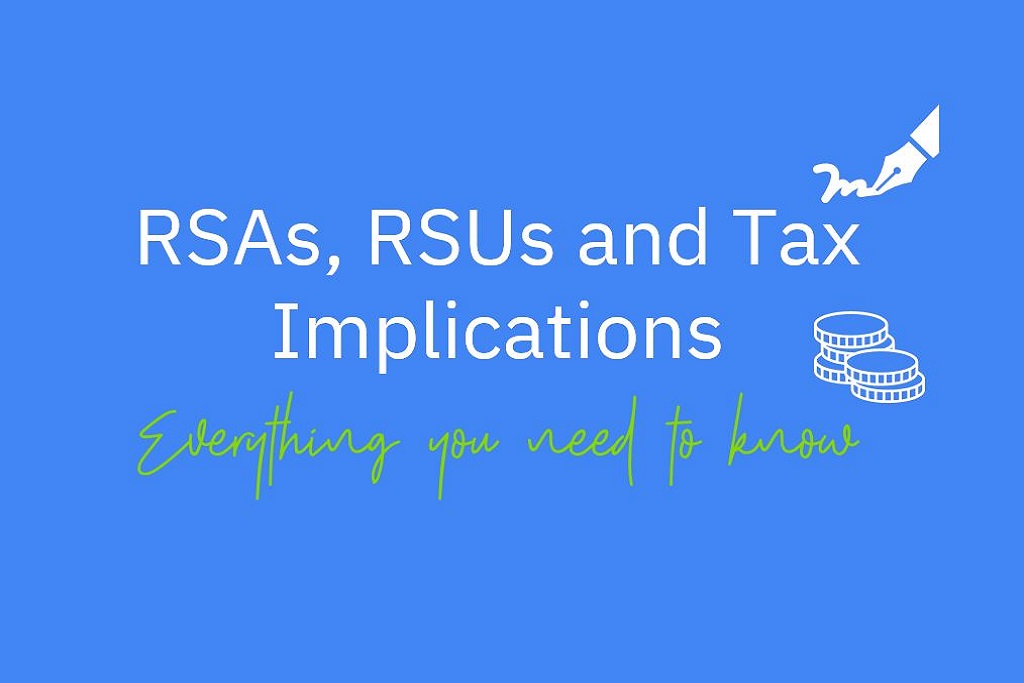Restricted Stock Award and Units
This article will explain two types of equity compensation as well as their tax implications: restricted stock units (RSU) and restricted stock awards (RSA).
Restricted Stock Units
RSUs are an unfunded promise to issue a specific number of shares at a future time once vesting conditions for the employee have been satisfied. The grant is “restricted” and subject to vesting schedule. RSUs are units that represent stock upon vesting. RSUs are not actual stock until vesting. Once they are vested then you have voting rights and dividend rights.
Vesting schedules are based on time, period with company, goals, performance metrics etc. A graded vesting schedule may also be used. Job termination almost always stops vesting unless an agreement exist to continue vesting after termination.
RSU can be received in cash or in stock once the vesting period passes. With RSUs, you are taxed when you receive the shares(fully vested). Your taxable income is the market value of the shares at vesting. They are always worth something even if the stock price drops.
Section 83(b) election is not applicable on a RSU. Read more about this here.
Restricted Stock Awards
Restricted stock is an actual share of stock that the employee receives, but the rights to sell or transfer the shares are restricted until the vesting period passes. RSA cannot be received in cash once the vesting period passes. They have already been received as stock at the time of transfer. RSA come with voting rights, because the employee own the stock at grant. Employees are restricted to sell them, unless vesting conditions are met.
Section 83(b) election is available on a RSA. Read more about this here.
Some important dates and terms:
- Offer date/Grant date/Issue date – the date of offering RSU
- The vest date – When the RSU is received or ownership is taken
- The selling price/market price – the price at which the stock was sold
- The selling date – the date on which the stock was sold
RSA & RSU Taxation
You do not owe any taxes at grant.
You have to pay taxes when you receive stock or when it vests.
- The total amount of stock vested should be reported as income on W2 line 1.
- The cost basis of the stock is adjusted for the amount reported as ordinary income.
You have to pay tax when you sell the stock.
- If you hold the stock for less than one year then you have short term capital gain or loss on it.
- The amount reported as short term capital gain is the market price minus the amount recognized as wages (adjusted basis of stock)
- If you hold the stock for more than one year then you have long term capital gain or loss on it.
- The amount reported as long term capital gain is the market price minus the amount recognized as wages (adjusted basis of stock)
Planning Tip
RS require planning to pay estimated taxes besides the high tax if the employer does not withhold taxes on RS. Please consult your tax advisor for avoiding penalties. Tracking basis is also key in avoiding double taxation on the gains.
If a valid 83(b) election is made within 30 days from the date of grant, you will recognize as of that date ordinary income based on the value of the stock at grant instead of recognizing income at vesting. As a result, any appreciation in the stock price above the grant date value is taxed at capital gains rates when you sell the stock after vesting.
While this can appear to provide an advantage, you face significant disadvantages should the stock never vest and you forfeit it because of job loss or other reasons. You cannot recover the taxes you paid on the forfeited stock. For this reason, and the earlier payment date of required taxes on the grant date value, you usually do better by not making the election. However, this election does provide one of the few opportunities for compensation to be taxed at capital gains rates.
In addition, if you work for a startup pre-IPO company, it can be very attractive for stock received as compensation when the stock has a very small current value and is subject to a substantial risk of forfeiture. Here, the downside risk is relatively small.
An 83(b) election is irrevocable.
Disclosure: This material has been prepared for informational purposes only. It is not intended as a substitute for personalized professional advice. You should consult your own tax advisors or contact us if you need help with implementing any ideas shared on this page.


